- Home
- Jack Canfield
Chicken Soup for the Soul Christmas Page 17
Chicken Soup for the Soul Christmas Read online
Page 17
Family tradition is kept alive when my sister-in-law, Marilyn and my nieces arrive with cookies, icing, and colorful sprinkles for a cookie-decorating party. The cousins always decorate cookies together each Christmas, and this year the tradition continues, even in the hospital. The four cousins squirt each other with icing and vie to make the most creative cookie. Our family laughs and giggles, and I see for the first time that we can have fun—even in the hospital.
Nurses tell us that celebrities will be at the hospital the next week, but I don’t really care. I just want to get Rebekah home! However, the pneumonia has a strong hold and keeps my courageous daughter in the hospital longer than anticipated. Sleepless nights, painful needles, and constant medications make the hospitalization difficult.
To our surprise, members of the Dallas Cowboys visit the hospital. Huge football players take time to attend a special event, meeting patients and talking with each child individually. Rebekah has her picture taken with Herschel Walker, Darryl Johnston, and Tony Casillas, just to name a few. And we are touched when Herschel carefully pulls children close to him for pictures. I wish everyone could see the gentle side of our sports heroes, who carefully hug sick children and talk in soft voices. For a few moments, sick children forget their pain and illnesses while celebrities focus on them. Tears stream down my face as I witness compassion and tenderness from the huge football players. These mighty players, who knock men to the ground during a game, joke with children who have tubes and IVs attached and ever so tenderly hug each child. For a moment, I forget we’re in a hospital.
Other exciting events occur that help me understand the true meaning of Christmas. Another day, members of the Texas Rangers baseball team spend a morning autographing pictures and visiting with sick children. Also, numerous deliveries of toys and gifts are made to each room from a variety of businesses. Santa Claus surprises each child, and Christmas carolers comprised of police officers sing to the children. One day, fingernail painting and hair styling is provided by a group of beauticians. Rebekah chooses bright purple polish for her nails.
Through the Troy Aikman Foundation, a wonderful and educational entertainment room was recently completed. Aikman’s End Zone features computers that allow hospitalized children to chat with kids in other children’s hospitals around the nation. Rebekah loves spending time in the room, and especially communicating with other sick children. The staff at CMC is determined to create an environment to promote healing.
So, even though Rebekah is very sick, she is not bored. My daughter is filled with hope and happiness. In fact, through the efforts of volunteers, sports heroes, and dedicated doctors and nurses, Rebekah has an amazing attitude. One night, Rebekah says, “Mom, I feel so special because so many people help children in the hospital!”
Finally, we receive the good news that our daughter will get to go home on Christmas Eve. It is a miracle because, days earlier, her body had been ravished with fever and pneumonia. Now, she is well! My heart is filled with gratitude toward all who helped. God has healed Rebekah. And again I am thankful for the power of prayer to our great and mighty God.
Was it just the medications that healed her, or the hope, encouragement, and prayers she received from so many? All I know is that when we left the hospital,we looked back to see the same twinkling lights, enormous Christmas tree, and toy soldiers at the entrance. But now the hospital no longer seems a place of despair, but a place filled with hope, healing, and cherished Christmas memories.
Marilyn Phillips
The Sound &Spirit of Christmas Through the Ears of a Deaf Woman
Christmas is not just a day, an
event to be observed and speedily forgotten.
It is a spirit which should permeate
every part of our lives.
William Parks
Each June, Nashville plays host to thousands of fans, who descend upon Music City to meet their favorite superstars at the Country Music Association’s Fan Fair. As John Berry’s publicist at the time, I accompanied the country superstar to this event in 1997. Little did I know that the sound and spirit of Christmas would find me a little early that year.
In a booth resembling his front porch on his Georgia farm, John sat in a rocking chair inviting fans to do the same in another rocking chair beside him. As I stood to the side, silently observing the scene, fans filed onto the porch.
From that stream of fans, one very special woman would capture all of our hearts as she reminded us that the spirit of Christmas is not confined to any one time of year or place or type of sound. We onlookers witnessed a Christmas miracle as thousands of others swirled around us.
Her name was Mary.* Mary was deaf, with only themost microscopic traces of sound penetrating her quiet world. John was her favorite singer, and she had come to present him with a request unlike any he had ever received before. Although deaf,Mary’s other sharpened senses allowed her to celebrate the world in a manner beyond the comprehension of most people. She absorbed music, not through the hearing world’s intricate system of hammers, anvils, and stirrups, but rather through her fingertips.
As we watched, Mary sat in the rocking chair next to John and explained to him how she would gently put her hands on stereo speakers and experience his music through the vibrations.
In this surreal environment, amidst a whirlwind of a million flashbulbs, concerts, and autograph sessions, Mary asked for the greatest gift one person can give to another—the loving gift of self.
“Will you please sing ‘O Holy Night’ for me?” Mary requested in a humble voice, which had been trained long before her ears had gone silent. “It’s my favorite song.”
The classic Christmas song had long ago become one of John Berry’s signature tunes.
Once John understood the enormity and unique nature of this request, he simply looked into Mary’s eyes and replied, “I would be honored.”
Closing her eyes, Mary gently placed her hands on John’s throat. John gazed intently at his audience of one and, in his best a capella, began to sing the song that is traditionally reserved for Christmas Eve.
“O holy night, the stars are brightly shining. It is the night of our dear Savior’s birth. . . .”
For us onlookers, Mary was what I call an earthly angel, who had been sent to teach us a lesson about the universal spirit of Christmas and living. Few words were spoken during those moments other than the unforgettable lyrics John was singing.
“Now long lay the world, in sin and error pining, till he appeared and the soul felt its worth. . . .”
I was merely a spectator, who was blessed, perhaps even divinely chosen, to stand in the larger audience surrounding the booth that day. We all stood quietly around the porch for this inspired performance, which was so removed from the revelry just a few feet beyond us.
Tears slipped from Mary’s clutched eyes, gracefully sliding down over her cheeks. John’s own eyes sent tears flooding forth as his powerful tenor voice held strong.
“A thrill of hope, the weary world rejoices, for yonder breaks a new and glorious morn. . . .”
As we watched, the strength and devotion of Mary touched each one of us in a special place deep within our souls. She granted us the privilege of being a part of her world for an exceptional instant. In those brief few moments, Mary allowed us to travel with her on an incredible journey to a sacred place and back, culminating with John’s vibrant conclusion.
“Fall on your knees, oh hear the angel voices, oh night divine, oh night when Christ was born, oh night divine, oh night, oh night divine.”
My mortal emotions silently beckoned for this moment to continue endlessly. However, these special moments, by mere design of nature, are not meant to last. I later grew to understand that these impermanent moments are meant to glimpse at and savor as they soar by us and through us like the shooting star that brilliantly blazes and then fades into ebony, bequeathing the fortunate viewer with an indelible impression and inspiration.
In the silence th
at followed, Mary opened her eyes and stared into John’s eyes for a moment. Then she simply said, “Thank you,” as she quietly stood and walked off the front porch, asking for nothing more.
John sat silently for a few moments, staring at Mary as she walked away.
As quietly and as unexpectedly as she had entered into each of our lives, Mary was once again enveloped by the immense crowd bustling back and forth in search of their own shooting stars.
I, too, would later blend into that crowd, but along with everyone else who had been swept away by Mary and John, I took with me an unlikely Christmas gift that afternoon. I learned that we need not experience the spirit of Christmas only on that day. Rather, it is with us every day if we open ourselves to experiencing and understanding these rare moments of inspiration.
Only fate knows if Mary and John and, indeed, the rest of us will ever cross paths again. The same divine fate that momentarily joined us suggests that we will not, but ours is a connection beyond this world now; it is a part of our eternal beings. Everyone who stood around that front porch in the sweltering heat on that long ago June afternoon in Nashville will forever share a precious bond for which we each, most especially Mary, gave one another a small piece of ourselves before traversing back into our individual worlds.
John E. Schlimm II
* For privacy, the woman’s name has been changed to Mary.
The Matchless Gift
Those who wish to sing always find a song.
Proverb
After my second graders completed reciting the “Pledge of Allegiance,” they settled back in their seats. But Duane remained standing. Duane was an exceptionally bright and lovable student, but his home life was far from perfect.
His mother was a single parent who struggled with many personal problems. Duane and his three younger sisters were often taken by Social Services when life got too tough for her. Thinking that maybe he had had a bad night, I walked over to him to see what was the matter. As he looked up at me with dark brown eyes, I could see his hurt and disappointment.
“Mrs. Brown, aren’t you going to open my Christmas present?” he asked. “I put it on your desk.”
As I looked at my desk, all I could see was an avalanche of papers, stickers, and books. Seeing my puzzled look, Duane went to the front of the room and retrieved his gift from my desk. As he handed it to me, I noticed the wrapping paper was a napkin from the lunchroom. Carefully removing the napkin, my gift appeared to be a matchbox.
Although I had only been a teacher for three months, I had learned the important lesson of asking a child to explain a picture or, in this case, a gift, instead of disappointing him with a wrong guess. So I asked Duane to tell me about his gift.
First, Duane instructed that I had to use my imagination before opening my gift. He then began to tell me that this wasn’t really a matchbox, but a jewelry box. Inside, if I would use my imagination, I would find two precious gems.
As I opened my jewelry box, I was surprised by the sight as well as the smell of two beer caps. Duane informed me that, instead of beer caps, they were really two precious silver earrings. He had noticed that I never wore earrings and wanted me to have some pretty ones.
My eyes began to tear at the thoughtfulness of this child’s precious gift. Since birth, one of my ears was slightly deformed. Fearing that wearing earrings might draw attention to the ear, I never wore them. But how could I not wear these precious earrings given by this special child? As I placed the earrings on my ears with masking tape, my class clapped, and Duane stood proudly beside me.
Every year after that, the matchbox remained on my desk. It reminded me of this child’s kindness and the wonderful lessons he taught me. Much like the widow and her two mites, Duane gave all he had, his heart. Although his situation at home was not the best, Duane continued to see the good in life. The beer caps were an ugly reminder of some problems in his neighborhood, but Duane had made them into something beautiful—two precious gems.
Although my ear was deformed, Duane still wanted me to have pretty earrings. Even though the matchbox had held the matches that lit cancer-causing cigarettes, his surprisingly tender heart allowed us all to see it as a treasure box instead of a dangerous weapon. Although Duane did not have much money, he still wanted to give. Whenever I see Duane’s gift on my desk, it encourages me. If I am having trouble reaching a student, I try to be like Duane and give that student a piece of my heart. When I am having a trying day, one glance at the matchbox reminds me of the small boy who had a trying day every day but still could find the treasures among the trash.
Out of the good heart of a second-grade boy, one teacher will always have a gift to treasure. Many holiday seasons have come and gone, but the memory of my matchbox gift never fails to warm my heart or be extinguished from my mind.
May we never fail to let even the littlest souls teach us. They are more than willing to teach, but we must be willing to take the time to truly listen.
Stephanie Ray Brown
“Thank you, Charlie. A snowball and you made it yourself! How thoughtful.”
Reprinted by permission of Stephanie Piro. © 2004 Stephanie Piro.
When Good Things Happen to Bad Children
You can learn many things from children.
How much patience you have, for instance.
Franklin P. Jones
When I remember my favorite Christmas gift as a young girl, I see a porcelain ballerina posed en pointe on an ivory and gold pedestal, with fragile arms softly framing her heart-shaped face. Wearing a short rose and cream tutu, she gazed at me from a store window as Mother and I shopped for Christmas.
At my insistence, we entered the small, musty store to examine her. The salesman informed us that the hand-painted ballerina wore a tutu of authentic cotton lace dipped in porcelain. The hand-sculpted pink flowers inset into her tutu and chestnut hair were exquisite. Such work made the figurine very expensive, but I begged my mother to buy her for Christmas, even if she were my only gift.
Each day, I asked my mother whether she had purchased the ballerina. “Wait until Christmas and find out,” she replied.
Finally, Christmas was just one week away, and my mother went grocery shopping, leavingme and my twelve-year-old brother, Charles, to mind the three younger children. The opportunity was too tempting to miss.
Charles didn’t hesitate to use his authority to boss us around while Mother was absent, but, of course, since I was a cocky eleven-year-old, I ignored everything he said.
To his horror, I announced my intention to find the hidden Christmas gifts and look for my ballerina.
The search began underneath my parents’ double bed. Lifting up the chenille bedspread, I saw nothing but dust balls and a snoring cat. Then I peered into their bedroom closet and found only clothing and shoes. Finally, I grabbed a wooden stool and headed for the hall closet.
Behind the cotton blankets on the top shelf were several packages in brown paper bags. My heart began to race as I retrieved the bags one by one to investigate them.
Charles warned me to stop and steadfastly refused to look into any of the bags himself. However, he reluctantly agreed to hold the stool while I reached for one last package on the highest shelf.
Suddenly, the phone rang, and Charles ran to answer it. As the stool tipped, I lost my balance, and the package in my hands hit the tile floor with a bang.
With my heart pounding, I carefully withdrew the white cardboard box inside the bag and opened it. Then I unfolded layers of crisp white tissue paper. Nestled in the bottom of the tissue was my dream gift, the porcelain ballerina I craved so desperately, but now she was a one-armed ballerina. The other one lay beside her.
“I knew that would happen,” declared my brother.
“It’s your fault her arm’s broken,” I wailed. “You shouldn’t have let go of the stool when the phone rang.”
Guilt, remorse, and panic overwhelmed me as I stared at the broken figurine. What had I done? Could I glue the
arm back on before my mother returned?
This accident was partly her fault, I rationalized. She often peeked at her own Christmas gifts. Obviously, this was a genetic tendency. I had inherited her gift-peeking genes.
Mother returned from the store with a car full of grocery bags to find me weeping hysterically at the back door. I grabbed her skirt and instantly confessed my crime, begging her forgiveness.
“Oh, Judy,” she cried. “When your father comes home, we’ll see if he can glue the arm back on, but don’t you dare look at any more Christmas gifts.”
Gratefully, I nodded my head as I wiped my dripping nose on my sleeve, relieved that the catastrophe hadn’t netted me worse punishment.
Somehow, my father managed to glue the arm back in place with the hairline fracture barely visible, and the Christmas gift disappeared once more from my sight.
The ballerina made her official debut on Christmasmorning, much to my relief and joy. I tenderly removed her from her wrappings and gazed at the delicate beauty that had almost been destroyed by my childish impatience.
She promptly took a position of honor atop a crocheted doily on my scratched-up mahogany dresser. There she remained for many years, a vivid reminder that occasionally, at least, good things happen to bad children.
Judy Lockhart DiGregorio
Reprinted by permission of Off the Mark and Mark Parisi. © 2007 Mark Parisi.
In-Law Survival Hot Line
This is my Christmas nightmare come true—my husband, David, our two-year-old, our newborn, and I crammed into David’s sister’s spare bedroom for the Christmas holidays. Our routine is topsy-turvy. No one can sleep. Molly won’t nurse. Haley throws potty-training right out the window.

 Chicken Soup for the Nurse's Soul: Second Dose
Chicken Soup for the Nurse's Soul: Second Dose Chicken Soup for the Ocean Lover's Soul
Chicken Soup for the Ocean Lover's Soul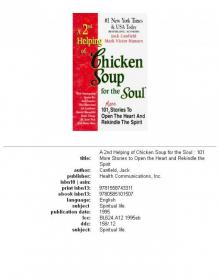 A 2nd Helping of Chicken Soup for the Soul
A 2nd Helping of Chicken Soup for the Soul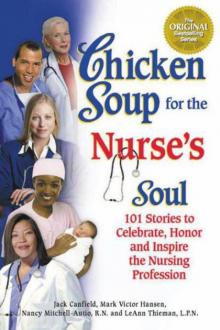 Chicken Soup for the Nurse's Soul
Chicken Soup for the Nurse's Soul Chicken Soup for the Breast Cancer Survivor's Soul
Chicken Soup for the Breast Cancer Survivor's Soul Chicken Soup for the Pet Lover's Soul
Chicken Soup for the Pet Lover's Soul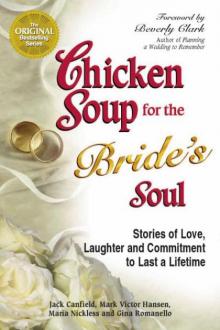 Chicken Soup for the Bride's Soul
Chicken Soup for the Bride's Soul A Chicken Soup for the Soul Christmas
A Chicken Soup for the Soul Christmas Chicken Soup for the Soul of America
Chicken Soup for the Soul of America Chicken Soup for the Teenage Soul on Tough Stuff
Chicken Soup for the Teenage Soul on Tough Stuff A Taste of Chicken Soup for the Teenage Soul III
A Taste of Chicken Soup for the Teenage Soul III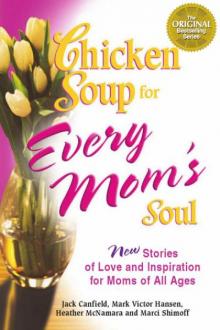 Chicken Soup for Every Mom's Soul
Chicken Soup for Every Mom's Soul Chicken Soup for the Dog Lover's Soul
Chicken Soup for the Dog Lover's Soul A Second Chicken Soup for the Woman's Soul
A Second Chicken Soup for the Woman's Soul Chicken Soup for the Soul the Book of Christmas Virtues
Chicken Soup for the Soul the Book of Christmas Virtues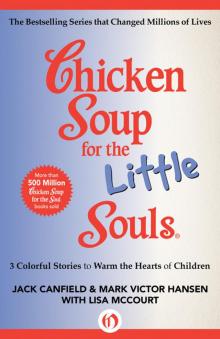 Chicken Soup for the Little Souls: 3 Colorful Stories to Warm the Hearts of Children
Chicken Soup for the Little Souls: 3 Colorful Stories to Warm the Hearts of Children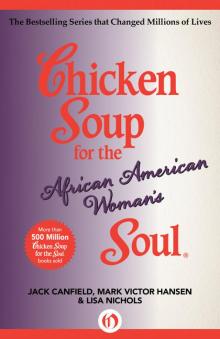 Chicken Soup for the African American Woman's Soul
Chicken Soup for the African American Woman's Soul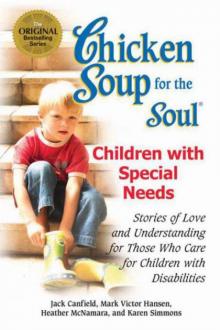 Chicken Soup for the Soul
Chicken Soup for the Soul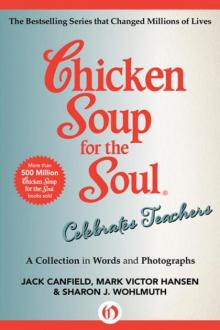 Chicken Soup for the Soul Celebrates Teachers
Chicken Soup for the Soul Celebrates Teachers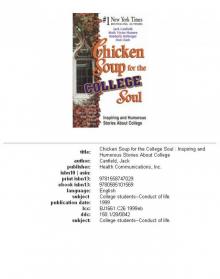 Chicken Soup for the College Soul
Chicken Soup for the College Soul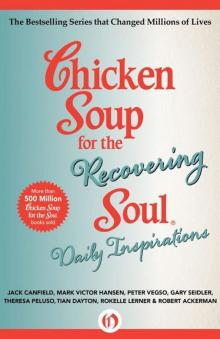 Chicken Soup for the Recovering Soul Daily Inspirations
Chicken Soup for the Recovering Soul Daily Inspirations Chicken Soup for the Soul Celebrates Sisters
Chicken Soup for the Soul Celebrates Sisters Chicken Soup for the Dieter's Soul
Chicken Soup for the Dieter's Soul Chicken Soup for the Soul at Work 101 Stories of Courage
Chicken Soup for the Soul at Work 101 Stories of Courage Chicken Soup for the Beach Lover's Soul
Chicken Soup for the Beach Lover's Soul Stories About Facing Challenges, Realizing Dreams and Making a Difference
Stories About Facing Challenges, Realizing Dreams and Making a Difference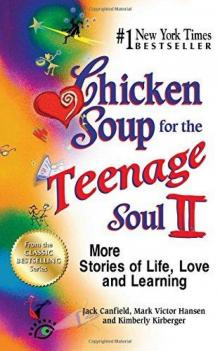 Chicken Soup for the Teenage Soul II
Chicken Soup for the Teenage Soul II Chicken Soup for the Girl's Soul
Chicken Soup for the Girl's Soul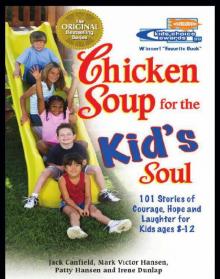 Chicken Soup for the Kid's Soul: 101 Stories of Courage, Hope and Laughter
Chicken Soup for the Kid's Soul: 101 Stories of Courage, Hope and Laughter Chicken Soup for the Woman's Soul
Chicken Soup for the Woman's Soul Chicken Soup for the Cancer Survivor's Soul
Chicken Soup for the Cancer Survivor's Soul Chicken Soup for the Canadian Soul
Chicken Soup for the Canadian Soul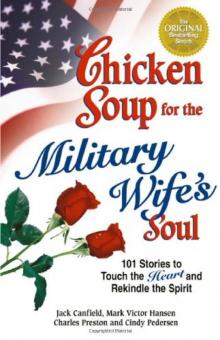 Chicken Soup for the Military Wife's Soul
Chicken Soup for the Military Wife's Soul A 4th Course of Chicken Soup for the Soul
A 4th Course of Chicken Soup for the Soul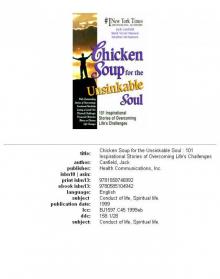 Chicken Soup Unsinkable Soul
Chicken Soup Unsinkable Soul Chicken Soup for the Soul: Christmas Magic
Chicken Soup for the Soul: Christmas Magic Chicken Soup for the Grandma's Soul
Chicken Soup for the Grandma's Soul Chicken Soup for the Soul: All Your Favorite Original Stories
Chicken Soup for the Soul: All Your Favorite Original Stories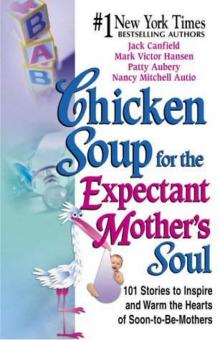 Chicken Soup for the Expectant Mother's Soul
Chicken Soup for the Expectant Mother's Soul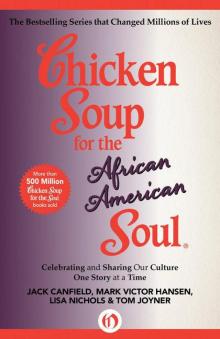 Chicken Soup for the African American Soul
Chicken Soup for the African American Soul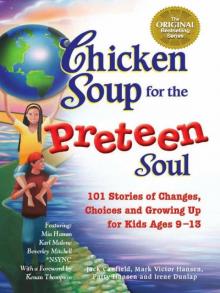 101 Stories of Changes, Choices and Growing Up for Kids Ages 9-13
101 Stories of Changes, Choices and Growing Up for Kids Ages 9-13 Christmas Magic
Christmas Magic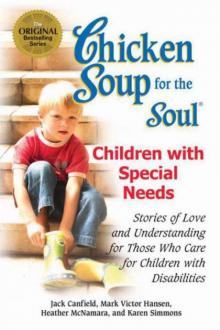 Chicken Soup for the Soul: Children with Special Needs
Chicken Soup for the Soul: Children with Special Needs Chicken Soup for the Soul: Country Music: The Inspirational Stories behind 101 of Your Favorite Country Songs
Chicken Soup for the Soul: Country Music: The Inspirational Stories behind 101 of Your Favorite Country Songs Chicken Soup for the Country Soul
Chicken Soup for the Country Soul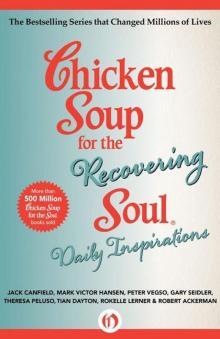 Chicken Soup for the Recovering Soul Daily Inspirations (Chicken Soup for the Soul)
Chicken Soup for the Recovering Soul Daily Inspirations (Chicken Soup for the Soul)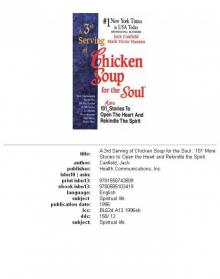 A 3rd Serving of Chicken Soup for the Soul
A 3rd Serving of Chicken Soup for the Soul The Book of Christmas Virtues
The Book of Christmas Virtues Chicken Soup for the Soul at Work
Chicken Soup for the Soul at Work Chicken Soup for the Soul 20th Anniversary Edition
Chicken Soup for the Soul 20th Anniversary Edition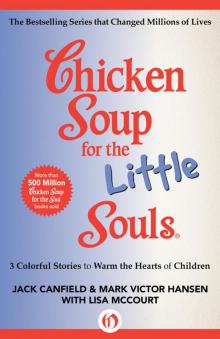 Chicken Soup for the Little Souls
Chicken Soup for the Little Souls Chicken Soup for the Soul: Reader's Choice 20th Anniversary Edition
Chicken Soup for the Soul: Reader's Choice 20th Anniversary Edition Chicken Soup for the Soul Christmas
Chicken Soup for the Soul Christmas Taste of Chicken Soup for the Teenage Soul III
Taste of Chicken Soup for the Teenage Soul III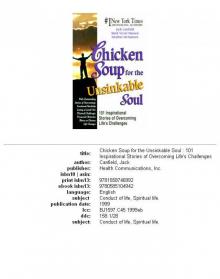 Chicken Soup for the Unsinkable Soul
Chicken Soup for the Unsinkable Soul Chicken Soup for the Preteen Soul II
Chicken Soup for the Preteen Soul II